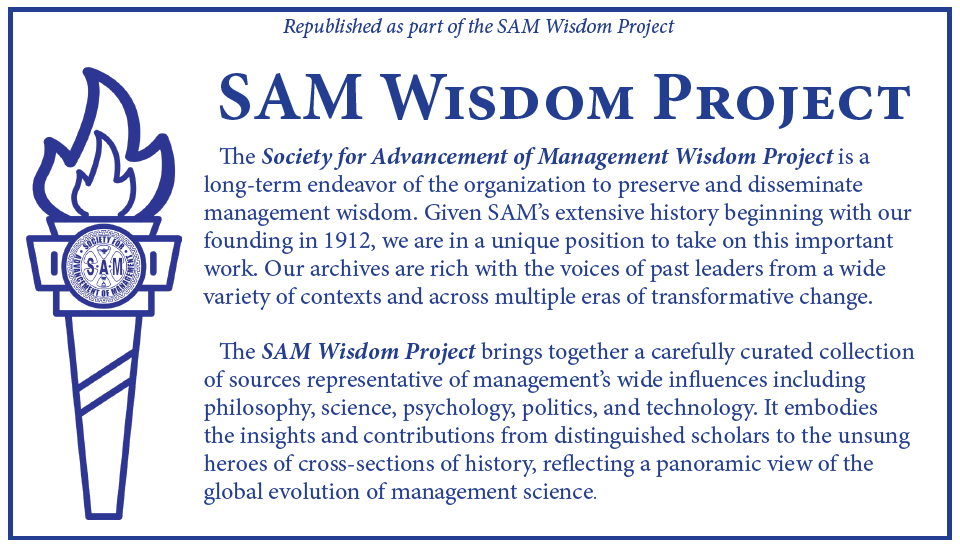
Abstract of an address at the Philadelphia Meeting, Oct. 24, 1914.
By Frederick W. Taylor
I had this summer a conference with Mr. Frankfurter, Professor of Humane Law at Harvard University, Mr. Valentine, Industrial Counselor, Mr. Kendall of the Plimpton Press, and Mr. King of the McElwain Shoe Co., on the subject of human rights. Messrs. Frankfurter and Valentine arraigned scientific management on the ground that it did not recognize the fact that unions arc here to stay, and that while they exercise the greatest power in behalf of the laboring people, scientific management is doing nothing to aid them in the work which they are undertaking. They failed to understand why the exponents of scientific management could not co-operate with the unions without risk to themselves in promoting scientific management, and why much more could not be accomplished with such co-operation of the unions.
I took issue with the arraignment, stating that we had never opposed the unions in anything they are doing for human rights, for scientific management is working for everything good which the unions want. There are two particular reasons why we oppose the unions,-their demand for a restricted output and their demand for collective bargaining. There is not a union in the United States which does not demand these two things.
It is an economic fact that increased wages and general greater prosperity can come only with increased output. The unions fight exactly that principle. They must agree upon increased output before we can co-operate with them. They would set the standard for a trade according to the worst man in the trade, not according to the normal man of that trade. According to that principle we would have to set the standard for a truck horse ‘according to the capacity of the smallest donkey, instead of according to the capacity of a normal truck horse. It is the workmen themselves who suffer by such absurd standardizations.
Mr. Frankfurter argued that an entirely new set of union men are coming in. They may be coming but we are not willing to acknowledge that they are here. A union of workmen who will not restrict output is what we want. We are with union men of that character. If unions will compel their members to do a full day’s work and compel every man in the union to learn his trade, then we will be with them.
With regard to collective bargaining Professor Frankfurter argued that workmen have no part in the setting of wages or of tasks. Men object to being brought under shop laws which they have no part in making. I replied by asking what proportion of the laws concerning which Professor Frankfurter lectures have been made by us who Jive under them. Every individual cannot take part in making every law.
Certain types of laws are too complex for the person of average experience to decide upon. Laws concerning divorce, marriage, assault, etc., the average man can pass upon because they are based upon facts of average experience. Other laws, based upon unusual experience, must be worked out by experts. Such are the laws determining wages. The task which a good man in a trade can perform and the wage he should receive for performing that task are matters which can be determined by expert investigation and should be so determined. They are not subjects for collective bargaining any more than the determination of the hour at which the sun will rise to-morrow.
“But,” objects Mr. Frankfurter, “the workmen have no part in the appointment of these experts. We ought to have half the say. The unions would be willing to pay half the wages of experts.” Any company that has any sense at all would be delighted to have the union appoint an expert and the company would be willing to pay the wages, for we are so anxious to discover the facts that we do not care where the expert comes from, because the laws which he makes must be true laws and must protect the expert from the union. It is not a question of who you are. Edison discovered the incandescent light. He was not appointed by anyone but he was the discoverer of one of the greatest of all things. There was no question as to who he was or whether he was a member of a union. The man who discovers facts and brings them to the world is an expert. He is a discoverer. It is of no importance who appoints him. The world is looking for him. But the expert cannot be a faker. He need not come from any college or from any clique; however, he must be the highest type of man.
If the unions will take up the education of their members, it will be a step in the right direction. They will have to take this step before we can co-operate with them. Instead of preparing for war they must try to promote working conditions which render possible higher wages.
The unions have done an immense amount of good. Unions have made better working conditions. They have stopped great injustices in the trades and for that they deserve commendation. Because a man points out that they are doing a few things that arc wrong it does not mean that he docs not tolerate anything that they are doing.

